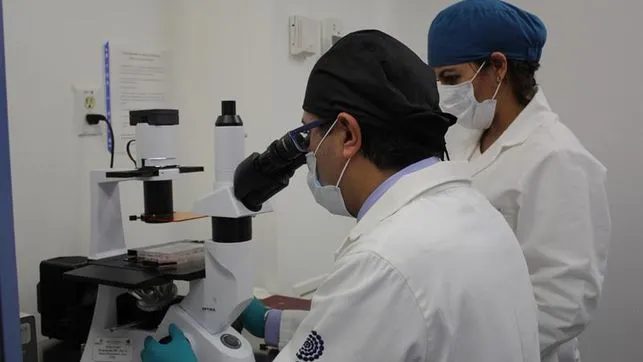Mexican researchers develop a study to regenerate in vitro cells extracted from the urine of patients with diabetes and parkinson, in order to create new diagnostic methods and improve pharmaceutical treatments against these conditions.
The academic of the Center for Research and Assistance in Technology and Design of Jalisco, Emmanuel Díaz, explained to Efe that with this procedure they can imitate how neurons and pancreas cells are born and developed to know in depth the way in which they are degenerate.
"It's like seeing a cell from birth to his death, but in vitro. In this process it is intervening with drugs and other procedures," said the doctor of biomedical sciences.
Scientists use urine samples of sick people and isolate adult cells that are related to Parkinson and Diabetes, and then "reprogram" inducing special genes known as "Yamanaka factors," he said.
The effect of these genes makes the cells return "to a very primitive state of development" or embryonic, that is, as if they began to develop for the first time, the expert explained.
These units are known as "trunk cells" or IPS cells (induced to their plenipotentiality), which are "the basis for generating skin, pancreas, cartilage or virtually any tissue of the organism," he said.
From this, the researchers "direct" or manipulate them to become neurons or pancreas cells.Of the millions of units that they obtain, some are observed to know in detail what their degeneration or deterioration towards the disease is.
In the case of Parkinson's evil, cells are used to test various combinations and doses of drugs, antioxidants, coenzymes and factors with neuroprotective effect, in addition to monitoring their response and defining which ones work better.
"If we with the drugs or antioxidants that we are testing prevent it from degenerating, we can already have the bases for a new treatment for the person without being tested in it," he added.
Díaz said that this procedure will allow "precision medicine", because the treatment that will be given will be "specific and personalized" according to the characteristics of each patient, since not all organisms respond positively to the same drug.
With regard to pancreas cells, researchers observe the degeneration process and subject them to genetic procedures that help to know how that organ can resist better certain type of eating habits from childhood and not generate diabetes or obesity.
"If we determine that it really has changes, we can introduce genes so that you can correct and support those metabolic challenges or food stress and that it is a robust pancreas, despite bad habits or bad diet and not degenerate in diabetes problems,"explained the head of the study.
In the short term, research will allow test kits to detect from childhood the predisposition that a person has towards heart disease, such as screening that is now performed on newborns.
"These screenings (scanning) already exist, but the current high costs make it prohibitive for 99 % of the population. What we want is to reduce those costs and that is a basic early diagnostic method and transfer technology to the health sector,"commented.


